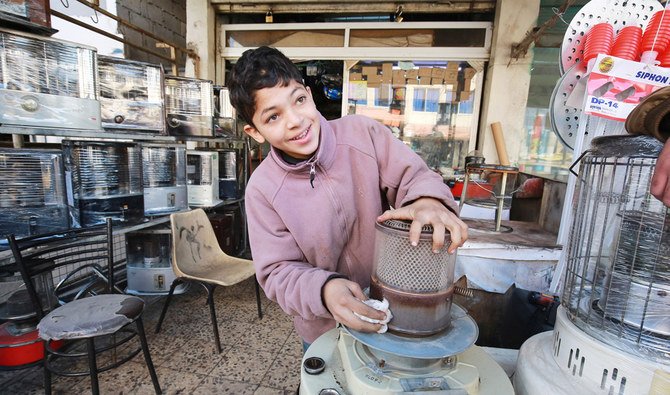AMMAN: Omar’s heart sinks when he trudges past his closed school gates in the Jordanian capital Amman — now part of his trip to work, to repair and clean kerosene heaters.
The 14-year-old, who dreams of becoming a pilot, is one of many minors experts say have been forced prematurely into the labor market.
Schools throughout Jordan have been closed for nearly a year now, and the economic fallout from the novel coronavirus pandemic has eaten into breadwinners’ ability to feed their families.
“As school is shut, I help my family financially,” said Omar, sporting a sweater and dirty jeans as he cleaned a heater with his blackened hands.
He works exhausting 12-hour days at the workshop, and collapses into bed after a shower and a quick evening meal.
Overall, the work “doesn’t bother me,” he said.
“What is unbearable is the smell of kerosene … (it) doesn’t go away.”
He earns three dinars (around $4.25) a day, which helps pay the family’s monthly rent of 130 dinars.
His contribution is vital because his father, a day laborer, has struggled to find work due to the coronavirus downturn.
But Omar has not given up hope, and said he was determined to return to school as soon as possible.
“I would love to continue my studies” and eventually become a pilot, he said. “I don’t want the coronavirus to destroy my dream.”
The Education Ministry has announced a return to classes next month for kindergarten and some elementary school levels, as well for students in their final year of high school.
Everyone else will have to wait until March.
UN children’s agency UNICEF said that while it had no hard statistics, it believed many Jordanian children had been forced into precarious work since the pandemic began — despite it being forbidden to employ those under 16.
Some 76,000 children were already working in Jordan according to the last official count, published in 2016.
“When we see children and when we speak to people, we are concerned that the numbers are increasing,” said Tanya Chapuizat, UNICEF’s country representative in Jordan. “It would seem logical… because we know the levels of poverty are increasing” during the coronavirus crisis, she added.
The official poverty rate in Jordan was 15.7 percent last autumn, but the World Bank has warned this will increase by 11 percentage points over “the short term.”
Experts fear child labor rates will surge even higher.
“I expect child labor to increase dramatically,” said Ahmad Awad, director of Jordan Labour Watch.
He pointed to both the rise in poverty and the pandemic’s negative impact on Jordan’s education system as drivers of this trend.
AFP






















